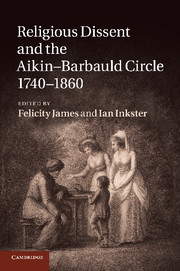Book contents
- Frontmatter
- Contents
- Notes on the editors and contributors
- Foreword
- Acknowledgements
- Chapter 1 Religious Dissent and the Aikin–Barbauld circle, 1740–1860
- Chapter 2 The Revd John Aikin senior
- Chapter 3 How Dissent made Anna Letitia Barbauld, and what she made of Dissent
- Chapter 4 ‘And make thine own Apollo doubly thine’
- Chapter 5 ‘Outline maps of knowledge’
- Chapter 6 ‘Under the eye of the public’
- Chapter 7 ‘The different genius of woman’
- Chapter 8 Lucy Aikin and the legacies of Dissent
- Chapter 9 The Aikin family, retrospectively
- Bibliography
- Index
- References
Chapter 8 - Lucy Aikin and the legacies of Dissent
Published online by Cambridge University Press: 05 November 2011
- Frontmatter
- Contents
- Notes on the editors and contributors
- Foreword
- Acknowledgements
- Chapter 1 Religious Dissent and the Aikin–Barbauld circle, 1740–1860
- Chapter 2 The Revd John Aikin senior
- Chapter 3 How Dissent made Anna Letitia Barbauld, and what she made of Dissent
- Chapter 4 ‘And make thine own Apollo doubly thine’
- Chapter 5 ‘Outline maps of knowledge’
- Chapter 6 ‘Under the eye of the public’
- Chapter 7 ‘The different genius of woman’
- Chapter 8 Lucy Aikin and the legacies of Dissent
- Chapter 9 The Aikin family, retrospectively
- Bibliography
- Index
- References
Summary
I want to begin with a snowy journey, a bitter, cold, long trek across country from a child’s viewpoint:
My grandmother, her maid, my little brother, and myself, were packed in a post-chaise; my father accompanied us on horseback. It was Christmas week, the snow deep on the ground; the whole distance was two hundred and forty miles across the country, and we were six days in accomplishing it.
This is the image with which Lucy Aikin begins her reminiscences, published by her nephew-in-law Philip Hemery Le Breton in 1864. She was 3 years old when her father, John Aikin junior, left Warrington Academy for Yarmouth, and the long journey across country, from one Dissenting stronghold to another, took its toll upon the family. ‘The last night we arrived at my aunt’s, Mrs. Barbauld’s, house at Palgrave’, she goes on, ‘where my grandmother remained behind; she died in a few days of the cold and fatigue of the journey’. Yet in some ways this memorial of her grandmother turns out not to be an act of family piety – like the poetry written by Barbauld about her female ancestors – but an overdue redress, since the grandmother is primarily remembered not with fondness, but for having rebuked the infant Aikin:
My father’s mother, who lived in the house with us, made some attempts to teach me to read; the extraordinary precocity of my aunt and of my eldest brother had perhaps rendered her unreasonable in her expectations of progress; she called me ‘Little Dunce’; the reproach sank deep, and its effect was certainly unfavourable; it did not rouse me to further exertion, for I had already done my utmost, and it filled me with a sense of incurable deficiency. How soon may the tender spirit of a child be broken, and its faculties permanently dulled by such treatment!
Already we have a sense of family history as vexed, as members are unreasonably compared to one another. The formidable intellectual inheritance of the Aikin family is shown to be a burden, as well as a blessing. For the Aikins, as Michelle Levy and Daniel White have explored, ‘the home is part of the public sphere, and the family itself is the institution most capable of effecting profound national change’, and in this volume different essays have demonstrated the ways in which such a family ethos was gradually constructed across the generations. In Lucy Aikin’s writing, however, we see the pressure of having inherited this collective identity, as she attempts to maintain and continue family legacies while also negotiating a place for her own role as a woman writer. Lucy Aikin’s vivid recollection of the smart of a childhood insult bears a close similarity to the Autobiography of Harriet Martineau, another Unitarian daughter, who also reports in detail childhood injuries and injustices which demonstrate the problems of establishing an identity within the larger family narrative. For Martineau release came through the collapse of the family textile business, allowing her ‘a wholly new freedom’ to write and publish; she further distanced herself through her later rejection of Unitarianism. For Lucy Aikin, a junior partner in the family business of letters, independence was harder to achieve.
- Type
- Chapter
- Information
- Religious Dissent and the Aikin-Barbauld Circle, 1740–1860 , pp. 183 - 204Publisher: Cambridge University PressPrint publication year: 2011
References
- 1
- Cited by



